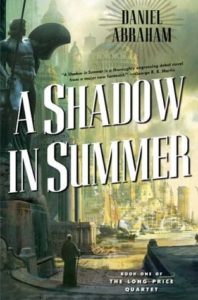
Daniel Abraham has co-written a hit science fiction series and written two fantasy series that seem to have small but dedicated followings. The Long Price Quartet is widely considered to be the slowest of the bunch, but, citing high-quality character work and an epic, generational plot that rewards the patient, the positive reviews tend to be downright glowing.
After reading A Shadow in Summer, I fully expect to join the ranks of Long Price devotees—this was my 59th novel (or novella) of the year, and it has been the best yet. It is slow-paced as advertised, but not in the typical epic fantasy way of spending hundreds of pages on worldbuilding and character introductions; in fact, my omnibus copy didn’t even hit 300 pages in total. Rather, the story feels slower because it is built on political intrigue and eschews action scenes. It’s not entirely without violence, but the conflict comes almost exclusively via plotting over periods of weeks or months.
A Shadow in Summer takes place in a world reminiscent of Southeast Asia, where people communicate in a complicated language of gesture as much as with words, and in which a limited but powerful magic is wielded by poets who capture and harness abstract concepts. Our story focuses on the intertwined fates of two poets—whose magic is fundamental to the economic success of the city—with a foreign merchant house seeking advantage in trade.
The conflict originates not from personal vendettas but from clashes of interests and obligations, and that is really where the story shines. Typically, talk of “gray morality” in fantasy refers to stories littered with characters who are jerks and don’t care. A Shadow in Summer is just the opposite—almost every significant character has a strong moral compass, but they’re put in no-win situations where they’re forced to choose between bad options, sometimes settling on the less wrong and sometimes the more. Ironically, the impersonal forces driving the story make the conflict all the more personal, and it results in rich, three-dimensional characterization and a morality that is weighty and complex without being gratuitous or shocking.
If I have any complaint about the story, it’s that the second half is a bit slower than the first, and the final climax isn’t as intense as the halfway climax. But overall, A Shadow in Summer does almost everything right, weaving a rich, intricate tapestry that builds slowly but achieves a remarkable depth of both character and plot in a relatively short novel. There’s a fascinating magic that sits in the background, worldbuilding that immerses the reader into the culture, complex and relatable characters, and a plot with moral complexity without falling into nihilism. And while doing so, it both tells a complete story and sets the stage for three more books in the series.
Highly recommended if you like: moral complexity, deep and realistic characters, more scheming than action, Asian-inspired fantasy, talking with your hands.
Overall rating: 19 of Tar Vol’s 20. Five stars on Goodreads.
